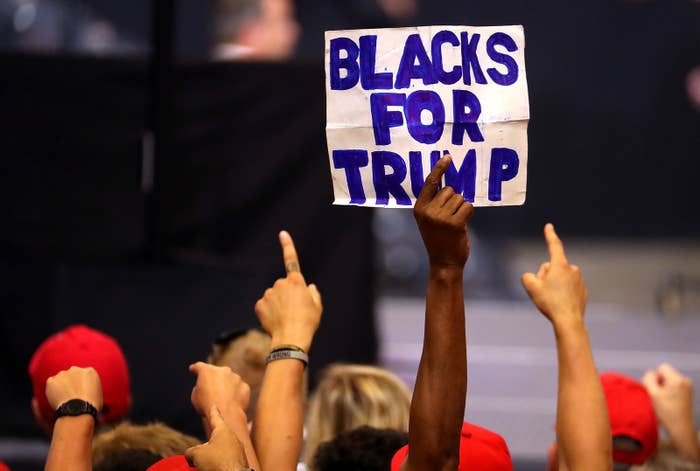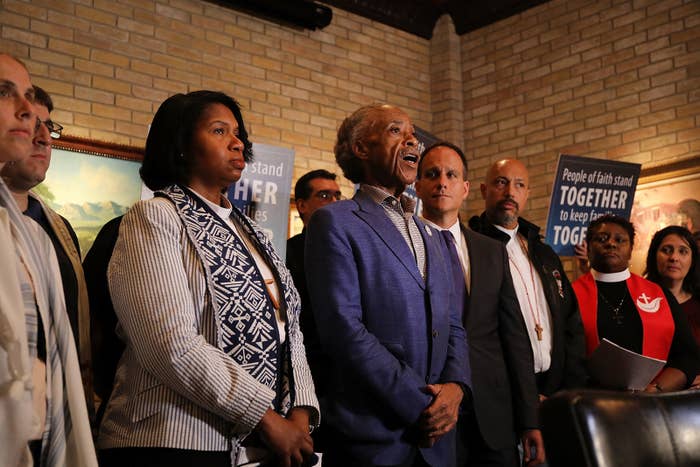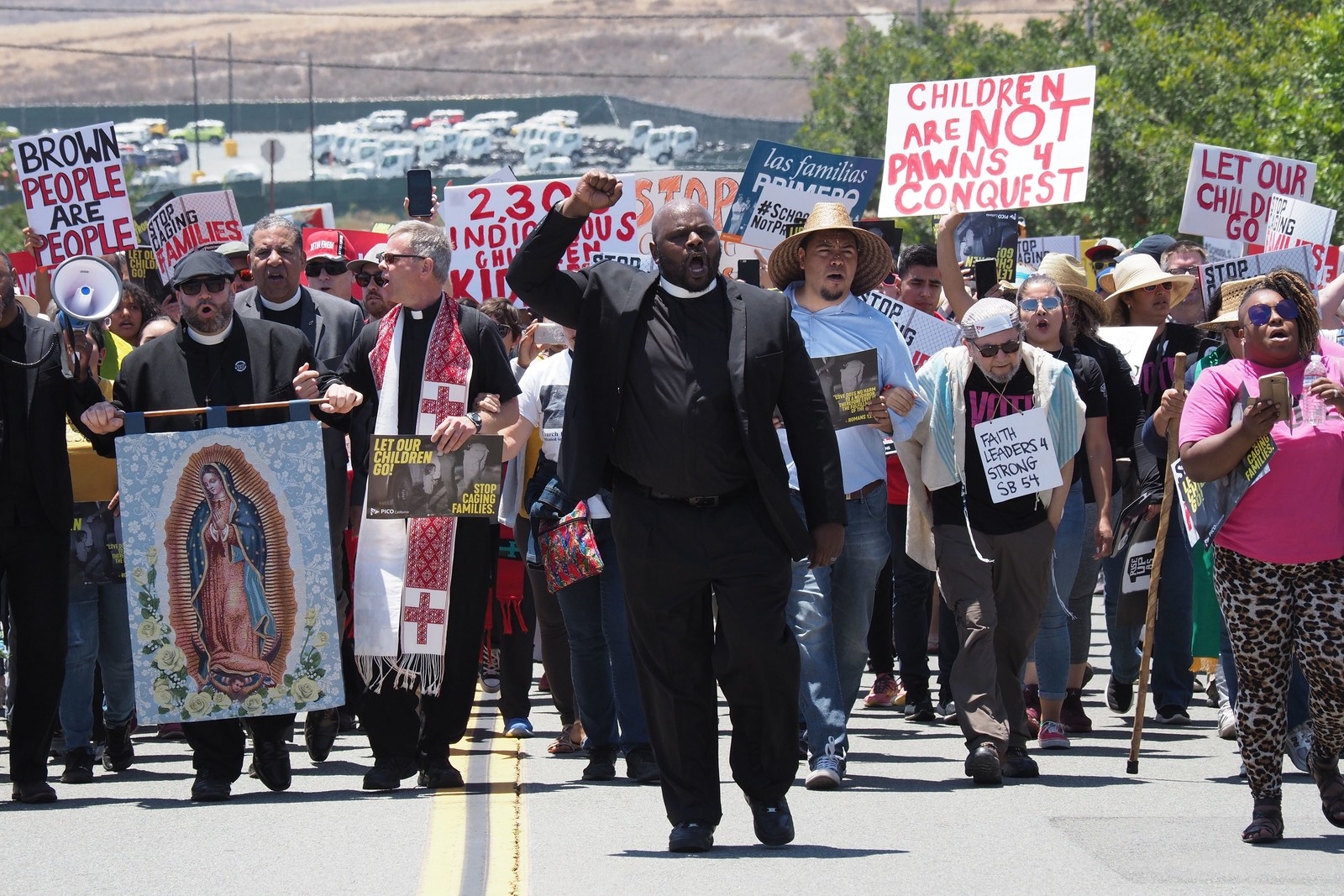
The White House has tried since the 2016 campaign to build support for a border crackdown in the black community by arguing undocumented immigration hits black Americans hardest — both in terms of safety and jobs. But as Donald Trump pushes forward with his administration’s harshest immigration crackdown since he’s been in office, no multiracial coalition has materialized to back him up.
As the Trump administration’s policy of separating immigrant children from their parents exploded into public view, the practice has received stern condemnations from establishment civil rights groups, Black Lives Matter activists, human rights groups, and everyday black Americans. It’s happening amid some doubt that a reversal by executive order that has only further complicated the question of how authorities will actually reunite families.
Trump has long pined for black allies on immigration by proposing expanded economic opportunity in exchange for votes that would help them enact harsher immigration laws. “No group has been more economically harmed by decades of illegal immigration than low-income African-American workers,” read then-candidate Trump’s “New Deal for Black America.”
Trump kept the offer on the table after he became president. He constantly touts low black unemployment numbers; he talks to people like Kanye West (“Thank you Kanye, very cool!”), and the newly arrived conservative provocateur Candace Owens; and he wants to increase single-digits approval ratings with black voters with 2020 in mind.
And it is true that there is a small group of black conservatives who generally support the president's plans, and agree with him on immigration, especially those on the receiving end of the White House’s efforts to engage black economic leaders on the nationalist economic agenda behind the scenes. One of the people who have been involved in those meetings is John Burnett, a Republican activist and an adviser to the New York Republican Party, who said he discussed with administration officials how to effectively communicate a message to black Americans on the benefits of coming down hard on undocumented immigrants. (They never called back.)
“It’s time for us to be a little selfish because we built America,” Burnett told BuzzFeed News, adding that black people’s blood is “still too damp in the soil” for black Americans to be concerned for undocumented immigrants. (“When has immigration been our friend? Coming off the slave ships? During Jim Crow? Or now?”) Burnett also doesn’t think that any accusation of promoting white nationalism should hinder black folks from coming to the negotiating table. “We can’t wait until we get an invitation to sit down with white supremacy. It’s been 500 years of that and as for right now, we have to try America first.”
Stephen Gilchrist, the president of the South Carolina African-American Chamber of Commerce, another leader who has willingly engaged the administration, said the White House has asked for help “navigating potential barriers” to America-first policies. Gilchrist said he didn’t agree with the separations. (“It was interesting to see the concern and empathy to the immigrants coming into the country because I don’t see the media being overly concerned about the African-American plight.”) But he said the current moment could be educational for black communities. “When you have the public’s attention you can push policies and implement something tangible. That’s when we can help [Trump’s] reelect, and shape how black people are viewed politically going forward.”
Raynard Jackson, a longtime Republican operative and the president and founder of the political action committee Black Americans for a Better Future, said he believes the press ignores data that shows black Americans are mostly opposed to liberal immigration policies. (He cited, for example, a March 2018 Los Angeles Times op-ed that made references to research showing various correlations between black people’s potential for upward mobility and immigration.) He thinks ultimately what is happening at the border is eventually going to be good for black Americans.
“[Liberals] want to give the public the impression that blacks support amnesty [for undocumented immigrants] when in reality we don’t,” Jackson said in an email to BuzzFeed News. “The media appointed leadership — NAACP, [National] Urban League, CBC, etc. — are totally out of step with the rank and file in the black community.”
Candace Owens, the young black woman who is the communications director for the pro-Trump group Turning Point USA, said she’d helped organize a recent retreat attended largely by black men, where participants discussed “at length” what “illegal immigration is doing to our country as a whole, and specifically (of course) to urban communities.”
Owens, like others, has waged her war more against black political malaise, blind allegiance to the Democratic Party, with Trump’s off-the-top-rope immigration stance as “a piece of a larger puzzle, in restoring our urban communities.”
“More to the point,” she said, “liberals trying to pull the wool over our eyes in their insistence that illegal immigrants are somehow a part of the American minority community is something that we intend to combat with vigor. Trying to convince black America to support illegal immigration is a bit like trying to trick someone into digging a grave that you intend to bury them in.”
That early White House pitch is still obsessed over by some party activists, and, fascinatingly, a few fringe actors on the dark, pro-black nationalist corners of the internet. The Republicans, like Burnett, Gilchrist, and indeed, Jackson, are still loyal to Steve Bannon’s mission of galvanizing black Americans around the theory of economic nationalism.
It didn’t take the White House long, though, to learn how difficult it would be to get black lawmakers and other political figures and activists to come to the table as a wedge on immigration, three current or former administration officials interviewed for this story said. “You can’t ignore what they want on criminal justice, public housing, knowing you need them to come to the table on immigration,” one of the sources close to the administration said. “Especially when they already think the administration is dismantling civil rights.”
And prominent figures have wanted no part of what’s being offered.

Rev. Al Sharpton, who led a campaign in support of the Deferred Action For Childhood Arrivals program, or DACA, late last year after Trump announced plans to end it, told BuzzFeed News that he was not among the figures that spoke with White House officials about buying into its immigration plans. Instead, Sharpton has recalibrated his career to fight Trump and convened black leaders in Washington last week to show a front of black-led collective support for undocumented immigrants.
In particular, evangelical Christians over the years have attempted to convince Sharpton that curbing the flow of undocumented immigrants the US would ultimately benefit black Americans, he said.
“It’s always, ‘They’re taking our jobs, that could be going to [working black Americans],'” Sharpton told BuzzFeed News by phone. “I think that is clearly how they’re trying to gain support for this. But when I’m back in Harlem talking to people on the ground or on my radio show about these separations, the outrage and anger black people are feeling nationally is tangible and it was not being reflected in the media.”
Toggling over access to resources like jobs, housing, and proximity to political power have long been part of the urban political landscape. But no real majority has gotten behind Trump, here, and it’s not yet clear that it ever will. North Carolina Rep. Alma Adams told BuzzFeed News that, thinking back to the civil rights movement, it was white Americans who helped the NAACP get started. “Our role as black elected officials is to not only help improve the quality of life of people who look like us but form a collective bond with people who are discriminated against. When we put our power together as a collective we are stronger and I think it helps us.”
The fight is being played out in real time across the US, but especially in enclaves where black Americans and immigrants have lived together for decades. On a closed-off block in New York City last week, a multicultural group of people danced to a lively salsa band. Kids shared pink bikes, thrilled to be riding on smooth pavement ashen with colored chalk. It was the kind of scene that is common in New York City, with a convergence of ages and ethnicities. The whole thing, about children being separated from their parents at the border, cast a strange pall hung over the unity, and everyone let out a collective groan when the organizer said the stage had to be taken down.

A black artist named Johari Mayfield who had danced the entire time called the separation practice “divisive” and Trump’s wish that black people back him up a desire “to see us separate.”
“In terms of immigrants, I don’t understand the position that’s creating this pain because the Native people were here first. So as far as I’m concerned, [Trump] is an immigrant.”
Mayfield said she felt it was sad and unfortunate that about what she feels amounts to a scare tactic, but seemed more angry that it took immigrant children being separated from their parents to get to a place where people wanted to take action. “Had Hillary been elected, would any of this be going on?”
Reginald Lewis, another concert spectator, said he thought that Trump signed the executive order to give himself cover — and to get his approval ratings up. “He’s not stupid. He knows how to rile things up and he knows how to get attention and then switch it up” for his benefit.
Lewis told BuzzFeed News that black people haven’t acquiesced to Trump’s offer in any meaningful way is because “we too strong as a people.”
“We understand this trauma, just like we understand families getting split up,” said Lewis. “They would take a few slaves and try to turn them against each other. So if you support that, what he’s doing to families, then you forgot where you came from. And if I would even get rich, it wouldn’t be worth it ‘cause it don’t make sense. You harm another person you give up your soul...so we gonna be rich for five years, but when the devil comes we gotta go to hell?
“Nah.”
